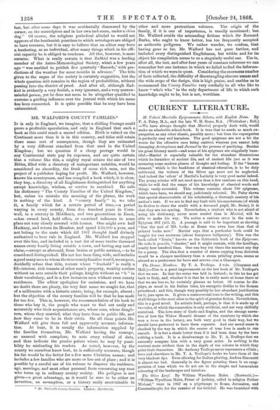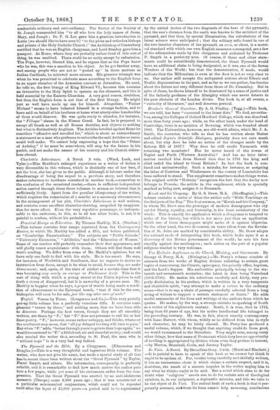The Olive Leaf. By William Wyndham Malet. (Bosworth.)— "William Wyndham
Malet, Priest of Ardeley, called in religion Father Michael," went in 1867 on a pilgrimage to Rome, Jerusalem, and Constantinople, for the reunion of the faithful. He was furnished with credentials ordinary and extraordinary. The Rector of the Society of St. Joseph commended him "to all who love the holy names of Jesus, Mary, and Joseph ; Dr. F. G. Leo gave him a gracious introduction in Latin (we should like to have seen it) " to the pious and orthodox bishops and priests of the Holy Catholic Church ;" the Archbishop of Canterbury certified that he was an English clergyman, and Lord Stanley gave him a passport. At Rome, where they are probably rather tired of this sort of thing, he was snubbed. There could be no unity except by submission. The Pope, however, blessed him, and he argues that as the Pope knew who he was, this was a sanction to his object. As he got further away, and among people who are not so " posted np " in these matters as Italian Cardinals, he achieved more success. His greatest triumph was when he was permitted to celebrate mass according to the English form in an upper chamber of the Armenian convent at Jerusalem. He used, he tells us, the first liturgy of King Edward VI., because this contains an invocation to the Holy Spirit to operate on the elements, and this is held essential by the Eastern Churches. A very good reason, doubtless, but then the English form is not that of the first liturgy. He might just as well have made up one for himself. Altogether, "Father Michael " seems to have behaved himself in a strange fashion, and to have said on behalf of his brethren at home what ninety-nine hundredths of them would disavow. He was quite ready to abandon, for instance, the "Pi/toque" clause in the Nicene Creed. In fact, he is prepared to accept all Greek as well as all Roman doctrine, and objects to nothing but what is distinctively Anglican. The Articles levelled against Rome he considers "offensive and uncalled for," which is about as extraordinary a statement as a man who professes to subscribe the said Articles ex animo could well make. We cannot help expressing a hope that the "Priest of Ardeley," if he must bo somewhere, will stop for the future in his parish, and not make the names of his country and his Church ridicu- lous abroad.



































 Previous page
Previous page